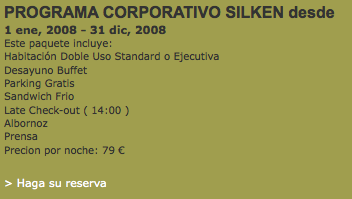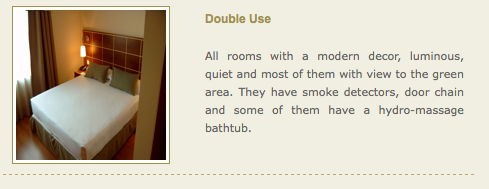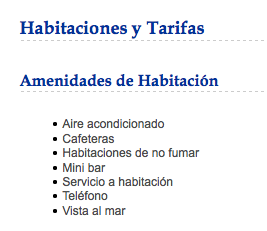Every sector and every profession creates its own jargon. In some cases this process is justified by the need of having to find a name for new concepts or concepts that do not exist yet, but in most cases, this jargon is unnecessary, dangerous and ends up creating confusion. This happens also in our market:
Room for “doble uso” (double use room)
What do we expect a non-expert to think this means? Does it mean he can use it in a different way? I still remember fondly the lady who called the hotel to find out if the “double use room” was cheaper than the double room because it would be used by two different sets of people before it was cleaned.
It is surprising to find the enigmatic “doble uso” published so many times.
Do you think that they will understand better what you are talking about if you say DUI?
There are some that even dare to make the same mistake in English: “Double use”
“Amenities” in the room
(it refers mistakenly to the bathroom products that for some strange reason some Spanish hoteliers describe as “amenities”).
The right translation of “amenity” into Spanish is much more than just bathroom products. Air conditioning, for instance, is an amenity. What would be the reason why in Spain, just in Spain, hoteliers call bathroom products amenities? In any case, the basket, the small soap bar and the rest would be “toiletries”. I ignore the reason of this strange use of the word, but it is a triple mistake: it ignores the words of the Spanish language, it deforms the English language and with it, they expect customers to understand what they mean.
Some, although trying to giving it the right meaning, they are just happy calling it “amenidades de habitación” (room fun). Are they products that make your room more interesting and fun?
Room “Facilidades”
(What in correct Spanish would be “Instalaciones de la habitación”, something like accessories or extras). The Royal Academy of the Spanish Language (RAE) defines it as:
facilidad. (From Lat. facilĭtas, -ātis).
… f. pl. Special conditions that allow you to achieve something with the least effort. For instance , “facilidades de pago”, payment methods.
Does it mean that they will allow you to pay for your room on installments?
Mysterious room types
Every hotel or chain has its own different way to refer to their several room types, which makes the issue even more interesting.
For instance, many hotels use without a problem the international words “superior, suite or junior suite” to refer to rooms that are more up the scale, however they still resist the idea of using the term “standard”, that would be the natural equivalent for the rest of the rooms. Maybe they just think it’s not prestigious enough for their hotel, as if standard meant vulgar. Many hotels have “superior” rooms but they come up with a new name for the “standard” rooms, which does not sound posh enough.
A typical case in Spain is that of the “AC rooms”. Probably the AC chain has very good reasons to call them like that. It’s not up to me to question their decision, but I suspect that the marketing arguments had more weight for them than those of having an easy to use name and something clear for the customer and on the Internet, clarity is or should be, the king…
A “Double use AC ” is probalby a “used double room with air conditioning, isn’t it? (AC: Air Conditioning)










No leo mucho los blogs por tiempo pero este tengo que decir que muy bueno y muy cierto.
Hija, no te falta razón, pero estos usos lingüísticos vienen en muchos casos de gente muy snob, que busca marcar en todo momentola diferencia incluso con el cliente. Es una primera regla, una de oro, facilitar toda la información esencial a un cliente a la entrada del hotel, pero en lo esencial, la reserva, sobre todo la telefónica, somos unos petardos y nos encanta pecar de sabedores de lo que llevamos entre manos además… No sé
Hay, efectivamente, demasiadas publicaciones que a los no versados les suena a chino, por ejemplo:
Precio por “habitación doble”.
¿porqué tengo que entender que en dicho precio la pueden ocupar dos personas?, puedo pensar que es una habitación de dos camanas y los precios varian si es para una sola persona o es para las dos.
Creo sería más sencillo indicar que el precio es de esta habitacion de 2 camas y la pueden utilizar (dos personas y algún, si tienen algun niño que precio se adiciona o si tambien está dentro del precio de dicha habitacion. HABRIA QUE SER MAS CONCRETOS.
Erfectivamente, debería ser más ilustrativo los nobres que se utilizan, puesto que no todos entienden el vocabulario tecnico utilizado
Efectivamente, pecamos de tecnicistas, de sabedores del sector. Incluso, habiendo trabajado en el mismo, cuando me convierto en cliente, y me las quiero dar “de guay”, me como mi sabiduría de mercadillo cuando el agente de viajes o la recepcionista en cuestión no entiende qué es una DUI…
Trabajando como recepcionista de noche, el elemento DUI, se antojaba a veces algo polémico, cuando un ejecutivo disfrutaba de una de estas habitaciones, pero a eso de la 1 de la madrugada hacia su aparición estelar con una señorita de compañía, que haciendo bien su trabajo, le acompañaba hasta el amanecer… ¿Deberíamos entonces haber cobrado como una habitación doble?… Nunca fue así…
Respuesta a Paloma.
Bien cierto es que debería cobrarse la habitación como doble, pero explícale tú al cliente el porqué y verás qué bien se lo pasan en el turno de mañana.
Afortunadamente, algunas cadenas usamos el reclamo de segunda persona gratis para que no tenga que justificarse nada ni nadie. Todo un acierto.
Por cierto, muy buen blog.
Me parece excelente el blog, ciertamente diciendo que lo que nos distingue en el mercado mas que el nombre o “nick” que le demos a nuestros productos, es nuetra diferenciación en el servicio…entre todo los demás factores que prelan (digase precio, localización, etc)…dejemonos de tanto tema y enfoquemonos en humanizar más el servicio que buena falta hace en estos tiempos que corren.
Un afectuoso saludo…
Magnífico artículo.
Evidentemente hay que vigilar el lenguaje con el que nos comunicamos con los clientes.
Las expresiones BB, HB, HD, late check out, etc, son muy complicadas para las personas que no están acostumbradas a la jerga y en ocasiones hay graves confusiones.